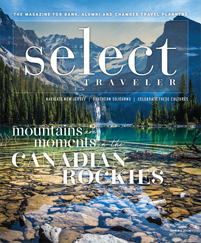Elephant Camps and Elephant Pants
Our first evening in Chiang Mai, our guide, Pan, took us to a traditional Lanna Khantoke dinner show at the Old Chiangmai Cultural Center, where dancers interpret historic Thai cultures. Pan told us that night that Thailand’s revered King Bhumibol Adulyadej was gravely ill. The following day, he confirmed the king had died. Our hotel, Le Meridien Chiang Mai, immediately assembled a tribute bearing his likeness in its lobby.
As we drove to Maesa Elephant Camp the following day, Pan compared cultures.
“The traditional occupation here in the north is farming,” he said. “We grow rice, beans, ginger. But today, tourism is the main business in Thailand. This is the land of the Buddha. Always take off your shoes to enter a temple or home, and bow to those you meet.
“Most families today want their children to be exposed to Western culture,” he said. “Only our seniors do not want that progress. Buddhism is flexible. Some go daily to the temple, but others just go on special occasions.”
“Elephants are sacred here,” he continued. “When they were used in the forests, most trained for about 10 years to learn how to work. Around 11 to 16, they began working on light jobs. From 17 to 38, they worked eight-hour days. At 50 or so, elephants’ vision and muscles begin weakening. Many are 70 years old or more at death.”
We watched as trainers fed the elephants and bathed them in the river. Two elephants embraced Kim with their trunks, and she loved it.
“There are maybe 15 elephant camps near Chiang Mai,” said Pan. “They have different philosophies. Many are for people who want to care for elephants. They stay long enough to learn commands and develop relationships with their elephants.”
We headed up to a demonstration hill tribe village not far away. The hill tribes are nomadic clans that have spurned civilization for centuries. In this constructed village, they grow rice using traditional methods in hand-tilled marshes.
“The idea here is to see them all in one place,” said Pan. “The owner divided the property so they could raise rice and animals and support themselves. To visit real villages, you need to drive a four-wheel-drive vehicle up into the mountains. Backpackers go up there and stay with them — it’s much more adventurous.”
That evening, we walked through Chiang Mai’s labyrinthine night market to buy silk scarves and elephant pants. Kim left home with standing orders from half a dozen people, so we checked those off the list.
“It is customary in Buddhist tradition to walk around the temple sites clockwise to keep the shrines and Buddhas on your right,” said Pan the following morning as we joined worshippers at the mountaintop temple, Wat Phra That Doi Suthep. Legend says a white elephant climbed this peak in the 14th century and died, marking the place King Nu Naone would build this sacred site.
That afternoon, Pan took us to the Bo Sang Handicraft Centre to see artisans creating colorful paper umbrellas. These decorative parasols are hand-painted on paper created on-site from tree bark. They feature bamboo frames and hinges and have no prefabricated parts. Kim bought one for 140 bahts — less than $5. You could sell them in the United States for 20 times that amount.
Our trip was over, and we had one night left in Thailand, so we grabbed a tuk-tuk and headed to Whole Earth, a restaurant we’d noticed earlier in the week. We didn’t have reservations, but we were offered a window table on the second floor, so we removed our shoes and headed up. There, among many Thai diners, we toasted our good fortune and enjoyed a delicious farewell dinner half a world from home.
My Thailand Takeaways
It’s a travel bargain. The dollar in exchange for Thai bahts is a remarkable value. A gourmet meal for two with drinks, dessert and tip runs well under $100. Hand-painted umbrellas sell for $5. A one-hour foot massage costs $10. Take $100 to a night market, and you’ll be there all night.
It’s for foodies. I had soups in Thailand with flavors I’ve never tasted before. What they do with opposing influences is an art form. It’s difficult to characterize what they create using lemongrass, basil, Thai curries and other spices, but the results are distinctly Thai.
It’s friendly. Thailand is a Buddhist culture. Buddhists believe that what you give to others comes back to you and how you treat others determines where your life will lead. Their culture is gracious, and there is no language barrier.
IT’s trending. Ritz Tours alone is taking 1,000 Americans a month to Thailand. From expats who move there to beachgoers who crash there, Thailand has a siren call that travelers are hearing.
For more information on booking this trip contact Ritz Tours at 888-345-7489 or go to www.ritztours.com.









